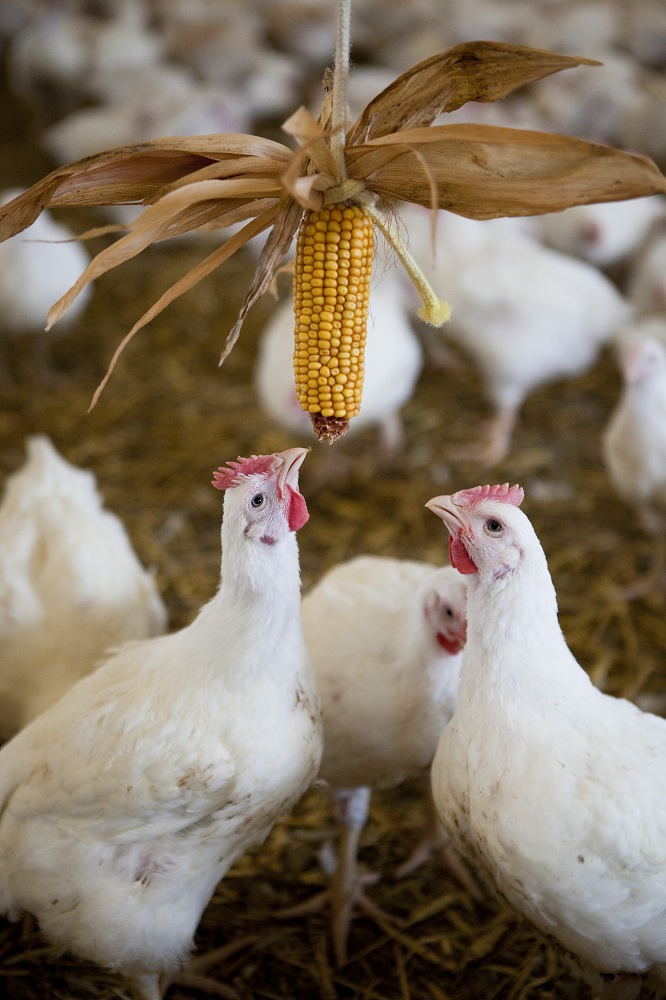Do the numbers stack up when the welfare impact of the Better Chicken Commitment is weighed against the cost of production?
Analysis into the Better Chicken Commitment (BCC), otherwise known as the European Chicken Commitment, shows that it could increase on-farm costs and greenhouse gas emissions, without delivering a demonstrable improvement in bird welfare.
The NFU commissioned two reports to see what this type of production would mean for producers – one to better understand the welfare claims behind the BCC and another to determine the potential economic and environmental impacts. While the findings showed that the BCC’s additional welfare requirements would not significantly improve animal welfare, it found that it would increase cost of production by 18%, produce 23% more greenhouse gas emissions and use 22% more water.
The reports conclude that stockmanship is the single biggest factor in animal welfare and are based on a comparison between Red Tractor and the BCC standard.
The NFU is urging retailers and food businesses to consider the outcomes of the reports and ensure that any decisions on committing to the BCC, with the aim to improve the welfare of chickens, are evidence-based and led by shoppers, and that they have fully considered how it will be delivered, given the increased cost of production. But despite the NFU’s strong views, the industry is split on how to respond to the growing pressure.
The scheme is being championed by welfare NGOs including Compassion In World Farming and the RSPCA. Major poultry buyers, including KFC, have said they will sign up to the commitment and only buy lower stocked chicken from 2026 for all their branches in the UK and Ireland. KFC is also publicly urging other major poultry retailers and foodservice companies to do the same.
And it’s clear some producers and processors are more enthusiastic than the NFU, because of the ease of management of birds in lower stocked houses. 2 Sisters is among the companies to shift some of its production.
By next July, 20% of throughput at 2 Sisters’ Willand processing plant in Devon will be Better Chicken Commitment chicken, 200,000 birds per week. A spokesperson for 2 Sisters declined to provide further details of its plans for BCC in the rest of the UK.
Avara Foods and Moy Park both declined to provide information about how much of its production is being converted to BCC. In a statement, Avara Foods said it was “looking at the evidence base and starting to compile our own”; while Moy Park said “We are taking the necessary time to research, trial and establish the facts around BCC”. However, senior leaders from both firms have recently made critical comments about the scheme.
At EPIC in November, David Neilson, general manager of breeders and hatcheries at Avara Foods told delegates not enough attention had been given to the environmental impact of lower stocking densities. “If every chicken was produced under the European Chicken Commitment, greenhouse gas emissions would increase 22%,” he said.
Justin Coleman, Moy Park’s agri-business and live production services director recently told Poultry Business it was important to focus on facts when discussing welfare. “As much as people are saying Better Chicken Commitment is great and what we do is not as great, there is a degree of needing to demonstrate this factually before we can get behind any one system. “Will there be a mass switch over to every chicken product? Probably not. Will it morph subtly into higher welfare tiers that carry more sway? Probably, yes.”
Tesco has recently found itself adopting this position. Despite spending the past few years embracing a strategy under chief executive Dave Lewis of streamlining ranges and stripping unnecessary products out, partly to fight back against the march of the discounters, it made the decision this autumn to launch a limited range of fresh chicken products in line with the Better Chicken Commitment, which will be on shelves in the new year.
One Tesco insider who attended the meetings where the decision was made said it was a “defensive” move, that came after sustained pressure from the NGOs. So far none of the other ‘big four’ retailers have signed up, but Waitrose and M&S have.
NFU poultry board chairman Thomas Wornham said the reports commissioned by the NFU showed it was imperative decisions are based on sound science.
THE SIX COMMITMENTS UNDER THE BCC
1. Comply with all EU animal welfare laws and regulations, regardless of the country of production.
2. Implement a maximum stocking density of 30kg/m² or less. Thinning is discouraged and if practiced must be limited to one thin per flock.
3. Adopt breeds that demonstrate higher welfare outcomes: either the following breeds, Hubbard JA757, 787, 957, or 987, Rambler Ranger, Ranger Classic, and Ranger
Gold, or others that meet the criteria of the RSPCA Broiler Breed Welfare Assessment Protocol.
4. Meet improved environmental standards.
5. Adopt controlled atmospheric stunning using inert gas or multi-phase systems, or effective electrical stunning without live inversion.
6. Demonstrate compliance with the above standards via third-party auditing.


